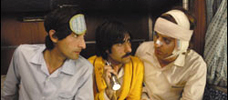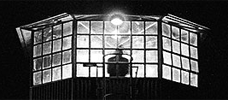Reviews
Aleksandra
Aleksandr Sokurov
France / Russia, 2007
Credits
Review by Leo Goldsmith
Posted on 08 October 2007
Source Rézo Films 35mm Print
Categories The 45th New York Film Festival
Alexander Sokurov’s films are rarely transparent in their intent. And yet it is clear, especially from his recent work, that Sokurov is deeply interested in politics and conflict, whether it is the roots of the contemporary world as seen through his series of films on 20th century leaders (Hitler, in Moloch; Lenin, in Taurus; and Hirohito, in The Sun) or through his epic digital-video glissando of the last three hundred years of Russian history in Russian Ark. Even when these films are opaque in their meaning or obscured under the layers of digital filtering that Sokurov has lately brought to his visual palette, his intent often seems to be to find a personal moment within a larger, depersonalized historical narrative.
What is most interesting about his latest film, Alexandra, is how straightforward it seems to be. Closely following its title character, the film concerns the trip an elderly Russian woman takes to visit her grandson, an officer in Russia’s army who is fighting the independence movement in the Chechen Republic. Alexandra has not seen her grandson in many years, and in the meantime he has grown to be a man, having become a man in the many years of the Chechen conflict. As Alexandra observes, touching dirty metal and canvas with her aging hands and gazing sadly at the boyish recruits in Denis’ unit, her grandson’s maturity has been spent in extreme conditions of heat and constant danger, hated by the locals, and in exile from his family and the comforts of life at home in St. Petersburg. He has shot many men, and his understanding of the world, voiced in clipped, uncomfortable conversations with his grandmother, reveals a bitterness, a desensitization, and a limitation of purview that may well stand in for Russia’s official stance on its most contentious member-state.
The style of Sokurov’s work has a certain variety — from the dour, utter impenetrability of his Oriental Elegy to the lush emotionality of Mother and Son — that may not be apparent to those who know the director solely through his relative blockbuster, Russian Ark. This new film is a far more intimate work, and as in the conjectural biographies in his “trilogy of power,” Sokurov here strives for a perspective so intimate that it is almost constrictive. Our perspective on this alien world — a world as desolate, yellow, and unforgiving as that of Turkmenistan in his 1988 film, Days of Eclipse — comes entirely through Alexandra’s eyes, and we see this world, its tragedy, its inequity, and its senselessness with all of the exasperation and mourning of an old woman. Played commandingly by the Russian opera singer, Galina Vishnevskaya, Alexandra has the air of a woman whose long life and hard experience have made her seemingly undaunted by the prospect of visiting a war zone. Wandering at will through the Russian military camp, talking to young recruits who seem not to have seen a woman (young or old) for months, she is totally immune to the rites and strictures of a martial life and will scold, talk back to, feed, or chat with virtually anyone she encounters without impunity. Her presence here automatically inspires humanist impulses of sympathy, indulgence, love, and nostalgia from all with whom she comes in contact.
These associations that Alexandra inspires work not only on the characters, but on the viewer, and Sokurov’s casting of Galina Vishnevskaya and his filming of the entire film in Chechnya itself are themselves part of a direct statement on the nature of the conflict. Alexandra at first seems to be a kind of “Mother Russia” figure, but it becomes apparent later, when she bossily takes a stroll to a local market like she’s merely going to the shops back in Petersburg, that she is more than a stand-in for nationalist sentiment. Suspicious though they are of the Russians among them, the locals soon begin to see Alexandra as just another elderly person — and an irritable one with bad legs, at that. With little concern for danger or the particularities of the Chechen context, she effortlessly befriends a local woman her own age, barters with local boys, and talks to others about their hopes and dreams, even as she stands in the rubble of their villages. Alexandra finds herself amongst people who have had their lives destroyed by the Russian army, and yet she is able to traverse both spaces, acting as a kind of bridge between both sides of the conflict.
Returning to the Russian camp, she again talks with her grandson, and although there is no overt (read: cheesy) bid for reconciliation and an end to war, we again see the other Russian military side of the conflict — the exhaustion and the apathy, the boredom and the grueling conditions. Amid the austerity, the heat and the dust, Alexandra appears as an embodied reminder of femininity and of nostalgia for childhood and home. This is made palpable in the simple image of Denis braiding his grandmother’s hair as he did as a child. The import is simple, tangible, and quite intimate, and Sokurov offers this image as a panacea for one of the major political issues of his nation in a way that is surprisingly direct.
More The 45th New York Film Festival
-

The Darjeeling Limited
2007 -

Hamlet
1921 -

The Romance of Astrea and Celadon
2007 -

Secret Sunshine
2007 -

Paranoid Park
2007 -

Alexandra
2007 -

Before the Devil Knows You’re Dead
2007 -

The Diving Bell and the Butterfly
2007 -

The Last Mistress
2007 -

The Man from London
2007 -

I’m Not There
2007
We don’t do comments anymore, but you may contact us here or find us on Twitter or Facebook.



